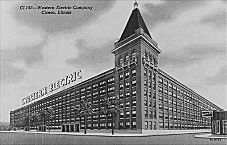| Entries |
| T |
|
Taylorism
|

|
Bibliography
Braverman, Harry.
Labor and Monopoly Capital: The Degradation of Work in the Twentieth Century.
1974.
Chandler, Alfred Dupont.
The Visible Hand: The Managerial Revolution in American Business.
1977.
The Electronic Encyclopedia of Chicago © 2005 Chicago Historical Society.
The Encyclopedia of Chicago © 2004 The Newberry Library. All Rights Reserved. Portions are copyrighted by other institutions and individuals. Additional information on copyright and permissions.
The Encyclopedia of Chicago © 2004 The Newberry Library. All Rights Reserved. Portions are copyrighted by other institutions and individuals. Additional information on copyright and permissions.